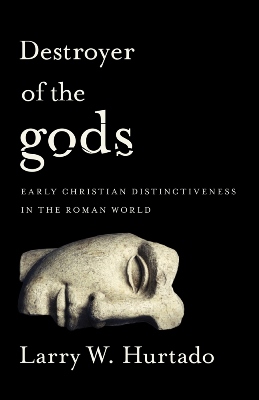| May 21, 2017 |
no comments
 Larry W. Hurtado, Destroyer of the Gods: Early Christian Distinctiveness in the Roman World (Waco: Baylor University Press, 2016), 304 pages, ISBN 9781481304740.
Larry W. Hurtado, Destroyer of the Gods: Early Christian Distinctiveness in the Roman World (Waco: Baylor University Press, 2016), 304 pages, ISBN 9781481304740.
Larry Hurtado is well known for his books on Christ-devotion among the earliest Christians, and for his text-critical work on the New Testament. In this new book, which began life as a lecture series at the China Graduate School of Theology in Hong Kong, he shows how the religion that sprang from Jesus’ activities and from the efforts of his disciples differed from other religions around the Mediterranean. In other words, it reads as a sort of “yes, but …” to balance all that has been written to show how early Christianity fits in with the other religions surrounding it.
While there is some value in highlighting the ways in which early Christians fit in with other religionists of their day, the task of doing that has been pursued for so long and so proficiently in certain circles that there’s a danger of losing sight of Christianity’s distinctiveness. Hurtado appears to be reacting to a certain one-sidedness one might find in some books. (There is, however, little interaction with other scholars in the main text.) Hurtado’s book is written on a semi-popular level (and with endnotes rather than footnotes), perhaps aiming at a readership more in thrall to what they read than scholars might be.
You have heard it said that early Christianity fit in with other religions surrounding it. Yes, but …
Hurtado looks closely at a number of aspects of Christian belief that show its distinctiveness as an ancient religion. His object not only is to show how Christianity was viewed by outsiders as “off, bizarre, in some ways even dangerous” (p. 2), but also to cure our “cultural amnesia” (p. 1). We are, after all, heirs of permanent changes Christianity made to how people typically think about God. Simply to refer to God in the singular, in fact, is one of these changes: before Christianity, people in the Greco-Roman world scarcely doubted the co-existence of multiple gods. Today the theistic question is never posed in terms of whether
gods exist, but only in terms of whether
God exists. (Perhaps the Neoplatonists deserve a little credit for this development as well.) Another huge change that Christianity effected was the severing of religious identity from ethnicity. Yet another change involved the place that Christianity awarded to its “book”. Whether or not Christianity is truly a book religion, its centralization of Scripture sets it apart from the cults of the Greco-Roman gods. Hurtado discusses these changes and more (including ethical norms), setting out the once-held strangeness of a way of thinking so many now take for granted.
If contemporaries of early Christianity perceived it to be a bizarre and dangerous belief, should that mean something for us today?
My only complaint is that the book presents the reader with endnotes rather than footnotes. Even for a semi-popular readership, footnotes are always better. (How can publishers
still think it’s right to make people turn to another part of the book for the details?) Viewed against what this book accomplishes (and how well it is written), this is a small complaint. I recommend this book for anyone interested in early Christianity—or for anyone interested in the general evolution of religious thought (worldwide).
Reviewed by John C. Poirier
Publisher’s page: http://www.baylorpress.com/Book/484/Destroyer_of_the_gods.html
Tags: destroyer, gods, hurtado, larry
Category: Church History, Spring 2017
 Larry W. Hurtado, Destroyer of the Gods: Early Christian Distinctiveness in the Roman World (Waco: Baylor University Press, 2016), 304 pages, ISBN 9781481304740.
Larry W. Hurtado, Destroyer of the Gods: Early Christian Distinctiveness in the Roman World (Waco: Baylor University Press, 2016), 304 pages, ISBN 9781481304740.

